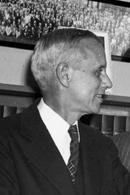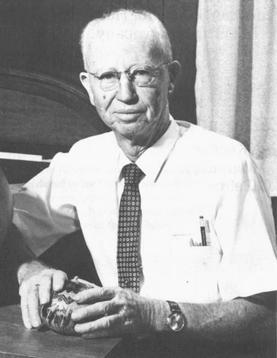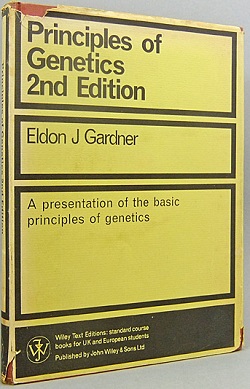Related Research Articles

Ruth Sager was an American geneticist. In the 1950s and 1960s she pioneered the field of cytoplasmic genetics by discovering transmission of genetic traits through chloroplast DNA, the first known example of genetics not involving the cell nucleus. The academic community did not acknowledge the significance of her contribution until after the second wave of feminism in the 1970s. Her second career began in the early 1970s and was in cancer genetics; she proposed and investigated the roles of tumor suppressor genes.

Edmund Ware Sinnott was an American botanist and educator. Sinnott is best known for his work in plant morphology.
Gabriel A. Dover was a British geneticist, best known for coining the term molecular drive in 1982 to describe a putative third evolutionary force operating distinctly from natural selection and genetic drift.

Glenn E. McGee is the Dean of Admissions at Salem College and Professor of health sciences at Salem College. He has been noted for his work on reproductive technology and genetics and for advancing a theory of pragmatic bioethics, as well as the role of ethicists in society and in local and state settings in particular.
H. Allen Orr is the Shirley Cox Kearns Professor of Biology at the University of Rochester.
Robert Loren Jaffe is an American physicist and the Jane and Otto Morningstar Professor of Physics at the Massachusetts Institute of Technology (MIT). He was formerly director of the MIT Center for Theoretical Physics.

Jeremy Mark Berg was founding director of the University of Pittsburgh's Institute for Personalized Medicine. He holds positions as Associate Senior Vice Chancellor for Science Strategy and Planning and Professor of Computational and Systems Biology at the University of Pittsburgh. From 2016 to 2019, Berg was editor in chief of the Science journals.

Dale Purves is an American neuroscientist. He is Geller Professor of Neurobiology Emeritus in the Duke Institute for Brain Sciences where he remains Research Professor with additional appointments in the department of Psychology and Brain Sciences, and the department of Philosophy at Duke University. He earned a B.A. from Yale University in 1960 and an M.D. from Harvard Medical School in 1964. After further clinical training as a surgical resident at the Massachusetts General Hospital, service as a Peace Corps physician, and postdoctoral training at Harvard and University College London, he was appointed to the faculty at Washington University School of Medicine in 1973. He came to Duke in 1990 as the founding chair of the Department of Neurobiology at Duke Medical Center, and was subsequently Director of Duke's Center for Cognitive Neuroscience (2003-2009) and also served as the Director of the Neuroscience and Behavioral Disorders Program at the Duke-NUS Graduate Medical School in Singapore (2009-2013).
Robert Reuven Sokal was an Austrian–American biostatistician and entomologist. Distinguished Professor Emeritus at the Stony Brook University, Sokal was a member of the National Academy of Sciences and the American Academy of Arts and Sciences. He promoted the use of statistics in biology and co-founded the field of numerical taxonomy, together with Peter H. A. Sneath.

Bruce Richard Korf is a medical geneticist at the University of Alabama at Birmingham. In April 2009, he began a two-year term as president of the American College of Medical Genetics (ACMG), a professional organization.

Walter Carl Hartwig is an American anthropologist, paleontologist, anatomy professor and author in the San Francisco Bay Area. In July 2020 he became Director of Enrollment Management and Student Success at Touro University California's College of Osteopathic Medicine, where he has served professionally for 25 years.

Manchanahalli Rangaswamy Satyanarayana Rao was an Indian scientist. He was awarded the fourth-highest civilian award, the Padma Shri, for Science and Engineering in 2010. From 2003 to 2013 he was president of Jawaharlal Nehru Centre for Advanced Scientific Research (JNCASR) in Bangalore, India.
Andrew Streitwieser was an American chemist known for his contributions to physical organic chemistry.

Thomas Wallace Whitaker was an American botanist and horticulturist who spent most of his career working as a geneticist for the United States Department of Agriculture (USDA). He specialized in the study of economically important plants such as squashes, investigating their systematics and resistance to disease.
Suhas Pandurang Sukhatme is an Indian scientist, teacher, author and a former Chairman of the Atomic Energy Regulatory Board of the Government of India, known for his expertise in heat transfer and energy technologies. He was honoured by the Government of India, in 2001, with the fourth highest Indian civilian award of Padma Shri.

The Principle of genetics is a genetics textbook authored by D. Peter Snustad & Michael J. Simmons, an emeritus professor of biology, published by John Wiley & Sons, Inc.. The 6th edition of the book was published on 2012.
Hari Krishan Jain was an Indian cytogeneticist and plant breeder, known for his contributions to the field of genetic recombination and the control of interchromosome level. He is a former chancellor of the Central Agricultural University, Imphal, a former director of the Indian Agriculture Research Institute and a recipient of honours such as Rafi Ahmed Kidwai Award, Borlaug Award and Om Prakash Bhasin Award. The Council of Scientific and Industrial Research, the apex agency of the Government of India for scientific research, awarded him the Shanti Swarup Bhatnagar Prize for Science and Technology, one of the highest Indian science awards, in 1966, for his contributions to biological sciences. He received the fourth highest Indian civilian honor, the Padma Shri, in 1981.
Daniel L. Hartl is the Higgins Professor of Biology in the Department of Organismic and Evolutionary Biology at Harvard University. He is also a principal investigator at the Hartl Laboratory at Harvard University. His research interests are focused on evolutionary genomics, molecular evolution, and population genetics.
Robert Philip Wagner (1918-2004) was an American professor of genetics who spent most of his academic career at the University of Texas at Austin. After retiring from academics, he served as a long-term consultant for the Los Alamos National Laboratory. He wrote a number of key textbooks in genetics and was known as an enthusiastic early proponent of the Human Genome Project.

Grant Robert Sutherland is a retired Australian human geneticist and celebrated cytogeneticist. He was the Director, Department of Cytogenetics and Molecular Genetics, Adelaide Women's and Children's Hospital for 27 years (1975-2002), then became the Foundation Research Fellow there until 2007. He is an Emeritus Professor in the Departments of Paediatrics and Genetics at the University of Adelaide.
References
- ↑ "News and Events". Archived from the original on 2014-12-02.
- ↑ Tamarin, Robert H. (1982). Principles of Genetics. W. Grant Press. ISBN 9780871507563.
- ↑ "Robert Tamarin".
- ↑ Paul, Diane B. (January 1998). The Politics of Heredity. SUNY Press. ISBN 9780791438213.